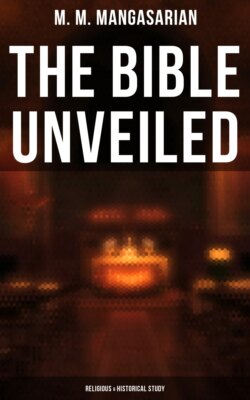Читать книгу The Bible Unveiled (Religious & Historical Study) - M. M. Mangasarian - Страница 8
На сайте Литреса книга снята с продажи.
The Sects and Their Bibles
ОглавлениеTable of Contents
The Jews deny that the second half of the bible is inspired; the Christians admit that the first part of the bible is not as binding as the second part.
The Jew fails to observe that, in denying inspiration to the New Testament, he is also depriving the Old of its inspiration. The arguments by which he disproves the New Testament are the same which disprove the Old, and all other "inspired" documents.
The Christian, by admitting that the Old Testament is no longer as binding upon the conscience of man as it was at one time, or as the New Testament is now, surrenders the whole question of inspiration. If the Old Testament has been superseded, the New might be, too. If what God says in one part of the book can be ignored by the Christians, what he says in another part of the book may just as reasonably be ignored by the Jews, and—this is important—what God says in either part of the book may be ignored by the Rationalist. In other words, the Rationalist agrees with the Christian that the Old Testament is passé, and with the Jews, that the New Testament is nothing more than ecclesiastical literature. The Rationalist uses the arguments of the Jew against the New Testament, and the arguments of the Christian against the Old, with the result that practically both Testaments fall by the blows of the sectarians themselves. Both Jew and Christian seem to be unable to perceive, or if they do, they are unwilling to admit, that not only has each destroyed the position of the other, but also his own.
All the objections which the Jew brings against Christianity are equally valid against his own Judaism. Does he object to the Christian trinity? There is a trinity also in his religion. In Genesis we read that the Lord appeared unto Abraham in three persons. He entertained and worshiped the three men as one Lord. Does the Jew object to the dogma of incarnation? In the Old Testament, God repeatedly appears in flesh and blood. Is it the immaculate conception that the Jew can not accept? In Judaism, too, that miracle was of frequent occurrence. Maidens in the Old Testament, as in the New, see an angel of the Lord and become pregnant. Is it the doctrine of hell to which the Jew objects? Jesus, in all probability, borrowed it from the Talmud. Is it an exclusive salvation that the Jew rejects? But the extra ecclesia non est solus of the Catholic is but another version of the "Outside Israel there is no salvation" of the Old Testament. Is it the doctrine of blood atonement in the New Testament which offends him? The Old Testament is as red as the New. The difference between Judaism and Christianity is one of name, largely. Is it not remarkable how people will subscribe to the very doctrines which they reject, if presented to them under a different name? Jew and Christian have persecuted one another in the past. Why? Only for a name. The pity of it! Judaism is Christianity, and Christianity is Judaism. They are called by different names—that is all.
To the Jew we say: "You will not take upon you the yoke of the New Testament; cast down also the yoke of the Old." And to the Christian we say: "You have already emancipated yourself from the authority of the Old Testament to a great extent; free yourself also from the authority of the New."
